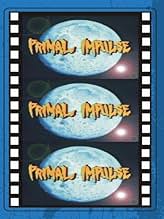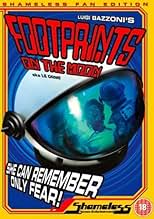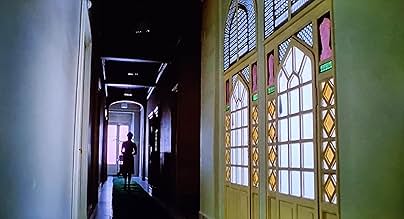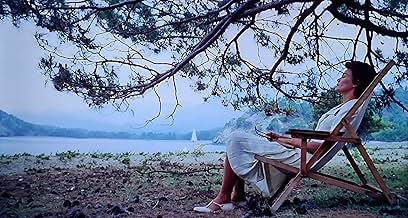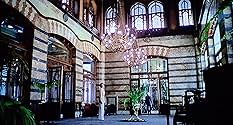IMDb RATING
6.6/10
2.8K
YOUR RATING
After being tormented by dreams about astronauts on the moon, a translator visits a deserted seaside town whose inhabitants know her, although she does not know them.After being tormented by dreams about astronauts on the moon, a translator visits a deserted seaside town whose inhabitants know her, although she does not know them.After being tormented by dreams about astronauts on the moon, a translator visits a deserted seaside town whose inhabitants know her, although she does not know them.
- Directors
- Writers
- Stars
John Karlsen
- Alfredo Laurenti
- (as John Carlsen)
- …
Miriam Acevedo
- Alice's Supervisor
- (as Myriam Acevedo)
Rosita Torosh
- Marie Leblanche
- (as Rosita Toros)
Feridun Çölgeçen
- Hotel Concierge
- (uncredited)
Bruno Degni
- Member of the International Congress
- (uncredited)
Franco Magno
- Member of the International Congress
- (uncredited)
- Directors
- Writers
- All cast & crew
- Production, box office & more at IMDbPro
6.62.8K
1
2
3
4
5
6
7
8
9
10
Featured reviews
Low-key psychological sci-fi thriller with some nice footage.
Alice (Florinda Bolkan), a translator living in Italy, discovers that she has a memory loss and can't recall the last couple of days. She starts to follow a trace of memory fragments, which leads her to the small town of Garma. People in the town seem to recognize her and she's beginning to suspect that the re-occurring nightmares of astronauts conducting horrible experiments has something to do with her own amnesia.
The movie is interesting and the plot is good, but it's a bit to slow moving and arty for my taste. The plot takes some nice twists and it's really hard to figure out where it's heading. Florinda Bolkan is good in her role (but even better in "Flavia the Heretic") and it's always nice to see "star" child actor Nocoletta Elmi. Klaus Kinski's role is too small though. This is not a movie for the die-hard gore hound or exploitation addict, but still a very nice hour-and-a-half mystery.
The movie is interesting and the plot is good, but it's a bit to slow moving and arty for my taste. The plot takes some nice twists and it's really hard to figure out where it's heading. Florinda Bolkan is good in her role (but even better in "Flavia the Heretic") and it's always nice to see "star" child actor Nocoletta Elmi. Klaus Kinski's role is too small though. This is not a movie for the die-hard gore hound or exploitation addict, but still a very nice hour-and-a-half mystery.
Very interesting psychological thriller
Footprints is a very interesting movie that is somewhat difficult to categorize. "Psychological thriller" is the most appropriate description I can think of. The female protagonist, Alice Cespi, discovers that she doesn't remember anything of the last three days. The only clue she has is a torn photo of a hotel. She is also haunted by a recurring, very vivid, dream about a science fiction movie that she believes she saw many years ago. In her pursuit of the truth behind her amnesia she doesn't trust anyone, but little by little it becomes obvious that she has visited the town where the hotel is located before. This is an exciting flick whose main virtue is that it is virtually impossible to predict how the events will unfold, and particularly, how it will end. The unusual loneliness of the main character and the unreliability of everyone else ensure that the good old paranoid feeling is present throughout the film, whereas beautiful colors and some spectacularly filmed sequences make this a visually attractive movie as well. The important part of the one and only Nicoletta Elmi, everyone's all time favorite redheaded obnoxious child star of Italian horror, is an extra bonus.
Trance-missions
Unable to cope with mounting pressures at work and haunted by visions of a lone astronaut abandoned on the surface of the moon, Alice travels to the exotic sea side town of Garma to get away from it all.
She encounters a number of people there who claim to know her from earlier as Nicole, even though she insists this is her first time there. Brazillian born Florinda Bolkan turns in a solid performance as the elusive Portugese translator caught in the grips of a fugue.
A strange but oddly compelling existential mystery about dual identities and self-fulfilling prophecies, Footprints on the moon is more reminiscent of art-house favorites such as Antonioni's L'aventura and Passenger and Resnais' Last Year at Marienbad, than say other Mystery/Thriller Genre fare so popular at the time in Italy.
The story unfolds at a languorous pace and things get redundant after a while, but it does allow Cinematographer extraordinaire Vittorio Storaro to really explore the unique locations and dazzle with his wonderfully dexterous camera-work. He furthers the style he pioneered in The Conformist.
Also, watch out for Klaus Kinski in a small role as a sinister Space Commander on the lookout for guinea pigs to conduct his secret experiments for a shadowy Government agency. Yes, I'm talking about the same movie.
She encounters a number of people there who claim to know her from earlier as Nicole, even though she insists this is her first time there. Brazillian born Florinda Bolkan turns in a solid performance as the elusive Portugese translator caught in the grips of a fugue.
A strange but oddly compelling existential mystery about dual identities and self-fulfilling prophecies, Footprints on the moon is more reminiscent of art-house favorites such as Antonioni's L'aventura and Passenger and Resnais' Last Year at Marienbad, than say other Mystery/Thriller Genre fare so popular at the time in Italy.
The story unfolds at a languorous pace and things get redundant after a while, but it does allow Cinematographer extraordinaire Vittorio Storaro to really explore the unique locations and dazzle with his wonderfully dexterous camera-work. He furthers the style he pioneered in The Conformist.
Also, watch out for Klaus Kinski in a small role as a sinister Space Commander on the lookout for guinea pigs to conduct his secret experiments for a shadowy Government agency. Yes, I'm talking about the same movie.
Footprints traveled
I consider this a missed opportunity. I have very fond memories of the filmmaker's debut, an interesting psychosexual oddity called La Donna Del Lago, and watching this I'm inclined to think that earlier film worked so well because the giallo had not been mapped down yet; so he was free to travel where it was novel at the time. Polanski got there that same year, but he was already a name and had Deneuve with him and so made the bigger splash. Film history has noted Repulsion.
This could have been even better. He has brought ambitious imagination with him, a visual palette of bright golden hues and relaxing blues, a sense of place and folded mysterious time with memory from Marienbad. He has Vittorio Storaro's eye behind the lens.
The opening is more than promising. A woman wakes up with no memory of three days past. She has just seen a dream, a feverish vision of astronauts staggering on blasted moonscapes, which she remembers is from a movie called the same as the one we're watching; but a movie she left without watching the ending. She goes to Italy to investigate, in an effort to bring these images into focus.
There it falls apart, in Italy incidentally. In the ten years since that first film that was in some ways a giallo ancestor the genre had come and was already on its way out. Between these two films Bazzoni had worked where it was the trend in the Italian industry, making a western and another giallo called The Fifth Chord. So when the more ambitious material for this came together, there were already footsteps he was expected to walk and had been trained to. The circumstances of a commercial movie industry were just so.
So for the middle part of the film we get a giallo worked from convention. The convoluted plot where each character withholds crucial information until the time is right, and the protagonist has to cobble together a puzzle from clues and red herrings. Much ado.
It comes full circle in the finale; the agents which she has imagined to be controlling her illusion return to pull her back into the fiction of the dream. It happens with extraordinary images of a stretch of empty cosmic beachside.
Bazzoni never made another film after this. In the meantime, Polanski had rocketed into Hollywood orbit and was already on his way out. I reckon that Bazzoni was one of our sad losses, but alas he never made it to France where money didn't always expect to fill a double-bill.
This could have been even better. He has brought ambitious imagination with him, a visual palette of bright golden hues and relaxing blues, a sense of place and folded mysterious time with memory from Marienbad. He has Vittorio Storaro's eye behind the lens.
The opening is more than promising. A woman wakes up with no memory of three days past. She has just seen a dream, a feverish vision of astronauts staggering on blasted moonscapes, which she remembers is from a movie called the same as the one we're watching; but a movie she left without watching the ending. She goes to Italy to investigate, in an effort to bring these images into focus.
There it falls apart, in Italy incidentally. In the ten years since that first film that was in some ways a giallo ancestor the genre had come and was already on its way out. Between these two films Bazzoni had worked where it was the trend in the Italian industry, making a western and another giallo called The Fifth Chord. So when the more ambitious material for this came together, there were already footsteps he was expected to walk and had been trained to. The circumstances of a commercial movie industry were just so.
So for the middle part of the film we get a giallo worked from convention. The convoluted plot where each character withholds crucial information until the time is right, and the protagonist has to cobble together a puzzle from clues and red herrings. Much ado.
It comes full circle in the finale; the agents which she has imagined to be controlling her illusion return to pull her back into the fiction of the dream. It happens with extraordinary images of a stretch of empty cosmic beachside.
Bazzoni never made another film after this. In the meantime, Polanski had rocketed into Hollywood orbit and was already on his way out. I reckon that Bazzoni was one of our sad losses, but alas he never made it to France where money didn't always expect to fill a double-bill.
A highly distinctive and left-field Italian thriller
Footprints on the Moon is an example of what could be described as a bloodless giallo. These were entries from the Italian sub-genre that were more directly psychological in approach. After the success of Dario Argento's The Bird with the Crystal Plumage in 1970, these more subtle gialli became scarcer on the ground and a host of serial killer flicks were the norm. Footprints harks back to the older style but adds a dash of 70's paranoid thriller into the mix. The result is a somewhat surreal film which has a decidedly enigmatic tone and effect. It was directed by Luigi Bazzoni and shot by Vittorio Storaro, who also was cinematographer on Crystal Plumage as well as the later Hollywood film Apocalypse Now (1979). This duo also worked together on the earlier classic style giallo The Fifth Cord (1971). Both their movies display restraint in terms of salacious material, while both look beautiful due to Storaro's consummate skill. The lunar material looks wonderfully off-kilter, the widescreen compositions are consistently great and the use of black and white to recall strange memories and dreams works extremely well.
It starts fantastically well with a startling opening segment set on the moon, where we see astronauts drag an unconscious compatriot and then abandon him. It turns out a female translator is dreaming about this, when she wakes she discovers she has no memory of the last three days. She recalls a film she saw many years earlier called 'Footprints on the Moon', a film that recalls her dream, where a scientific experiment is carried out where astronauts are left stranded on the moon to test them. She discovers a torn postcard addressed to her of a place she is sure she knows but does not know why, she travels to this off-season tourist area and meets several people who know her but whom she does not know herself.
This one is typified by a sustained atmosphere of dread and it really delves into the fragile psychology of the protagonist, who is very well played by Florinda Bolkan, who was one of the most talented of the performers to regularly appear in gialli. This role is a fairly complex one and benefits a lot from Bolkan's subtle skills. There is also an appearance from another giallo regular, Nicoletta Elmi, the little red headed girl who played oddball children in several films from the time. In this film, she is given a bit more to do and is a little more integral to the plot. Evelyn Stewart and Klaus Kinski appear briefly, the former as Bolkan's friend in Italy and the latter as the mad scientist Blackmann from the film-within-a-film. The location where most of the action occurs is the resort of Garma which is an otherworldly dream-like place, with a vaguely Arabic feel and ruins; it feels like a dying place. The film feels like a combination of dreams, reality and movies. The science fiction film-within-a-film is a strong idea and the image of the abandoned astronaut is a peculiar and compelling one. This sci-fi thread blends into the fabric of the main story and that by the unforgettable final moments it has encroached entirely into Bolkan's reality. It's a memorably surreal way to end one of the most distinctive films in the giallo sub-genre.
It starts fantastically well with a startling opening segment set on the moon, where we see astronauts drag an unconscious compatriot and then abandon him. It turns out a female translator is dreaming about this, when she wakes she discovers she has no memory of the last three days. She recalls a film she saw many years earlier called 'Footprints on the Moon', a film that recalls her dream, where a scientific experiment is carried out where astronauts are left stranded on the moon to test them. She discovers a torn postcard addressed to her of a place she is sure she knows but does not know why, she travels to this off-season tourist area and meets several people who know her but whom she does not know herself.
This one is typified by a sustained atmosphere of dread and it really delves into the fragile psychology of the protagonist, who is very well played by Florinda Bolkan, who was one of the most talented of the performers to regularly appear in gialli. This role is a fairly complex one and benefits a lot from Bolkan's subtle skills. There is also an appearance from another giallo regular, Nicoletta Elmi, the little red headed girl who played oddball children in several films from the time. In this film, she is given a bit more to do and is a little more integral to the plot. Evelyn Stewart and Klaus Kinski appear briefly, the former as Bolkan's friend in Italy and the latter as the mad scientist Blackmann from the film-within-a-film. The location where most of the action occurs is the resort of Garma which is an otherworldly dream-like place, with a vaguely Arabic feel and ruins; it feels like a dying place. The film feels like a combination of dreams, reality and movies. The science fiction film-within-a-film is a strong idea and the image of the abandoned astronaut is a peculiar and compelling one. This sci-fi thread blends into the fabric of the main story and that by the unforgettable final moments it has encroached entirely into Bolkan's reality. It's a memorably surreal way to end one of the most distinctive films in the giallo sub-genre.
Did you know
- TriviaOn Mill Creek's 50 movies set "Sci-Fi Invasion", the movie is available under its alternate title "Primal Impulse".
- GoofsCrew member visible reflected in mirror when Alice wakes up in the Peacock Room.
- Quotes
Alice Campos: I'm not crazy!
- How long is Footprints on the Moon?Powered by Alexa
Details
- Release date
- Countries of origin
- Language
- Also known as
- Primal Impulse
- Filming locations
- Production company
- See more company credits at IMDbPro
- Runtime
- 1h 30m(90 min)
- Sound mix
- Aspect ratio
- 1.85 : 1
Contribute to this page
Suggest an edit or add missing content


